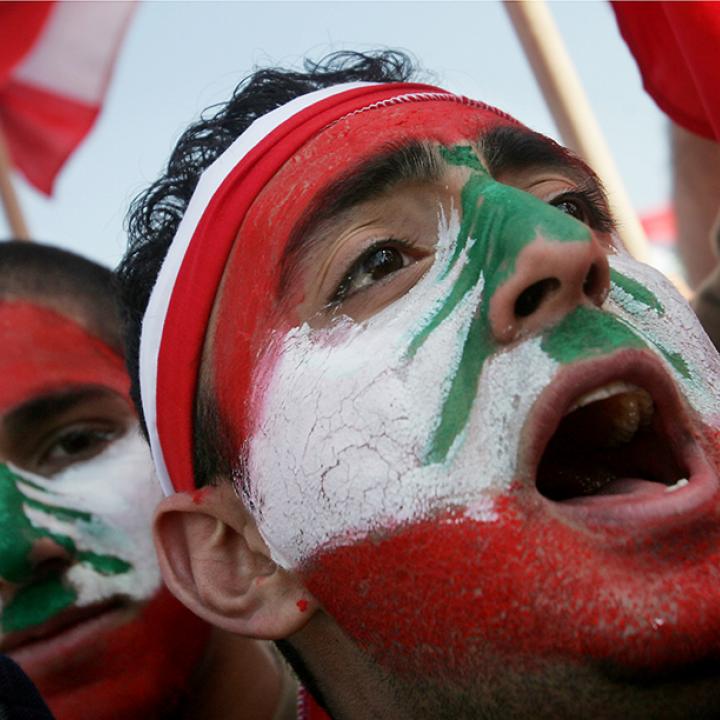
- Policy Analysis
- Fikra Forum
Behind Lebanon's Continuing Crisis Sunnis heavily anti-Hezbollah; Shia mostly for it; Christians split

November 9, 2017
The sudden resignation on November 4 of Lebanon’s Sunni Muslim prime minister, Saad Hariri, cast a harsh spotlight on his country’s internal polarization and external ties to Iran. Speaking from Saudi Arabia, where he remains in exile, Hariri blamed both of those Shia-dominated actors for Lebanon’s growing troubles – and for his own fears of assassination. Now a new public opinion poll illuminates the depth of these sectarian cleavages underlying this current crisis.
Lebanon’s 4 million citizens are divided among many diverse religious denominations, or “confessions” in local parlance. So politically charged is this division that no official census has been conducted since 1932, exact numbers are difficult to come by. But a reasonable estimate is this: around 40 percent are Shia Muslim; 30 percent Sunni Muslim; 25 percent Christians (Maronite, Greek Orthodox, Greek Catholic, Armenian, Protestant, and other); and the remaining 5 percent mostly Druze, plus a few other small minorities.
Asked about their attitude toward Hezbollah, the extent of Lebanese sectarian polarization is sharply evident. Among Sunnis, 85 percent express a negative view, and just 14 percent a positive one. But among Shia, the proportions are almost exactly the reverse: 88 percent voice a positive opinion of Hezbollah (including a striking 83 percent “very positive”); while a mere 11 percent say they have a negative opinion.
The latter numbers, while still heavily tilted toward Hezbollah, represent a slight decline since the previous poll two years ago, when a remarkable 94 percent of Shia voiced support for it. And there is some recent evidence that privately, Shia support for Hezbollah may have declined even more. For example, in the 2016 local elections, 45 percent voted against Hezbollah and affiliated Amal candidates, even in their supposed stronghold of Baalbek.
More surprisingly, Lebanon’s substantial Christian minority remains split almost down the middle on Hezbollah: 45 percent in favor, 55 percent opposed. These numbers, too, represent a small erosion in popularity for this movement. Yet almost half of Lebanese Christians still apparently adhere to the view of the country’s Maronite president, Michel Aoun, that Hezbollah represents a positive player in the Lebanese arena.
Regarding Hezbollah’s patron Iran, opinions are similarly divided. Lebanese Sunnis are overwhelmingly (88 percent) opposed to Iran’s regional policy, but Shia are about equally (82 percent) supportive. Christians are again in the middle -- but this time more negative toward Tehran, by about a two-to-one margin: 63 percent vs. 37 percent. Views on the importance for Lebanon of good relations with Iran, “regardless of your personal opinion about its policies,” are sharply divided among these three major communities, on roughly the same lines.
By comparison, Lebanese attitudes toward U.S. policies are likewise very mixed, along a mirror-image sectarian split. Shia are almost uniformly negative (87 percent). But among both Sunnis and Christians in Lebanon, half have a positive view of U.S. Middle East policy, far more than among any other Arab society polled lately. Nevertheless, only about a third of either community think it is important for their country to maintain good relations with Washington.
On the brighter side, alongside these deep cleavages, the majority of each major community voices a desire for religious tolerance. Nearly all in each sectarian group agree that “Arabs should work harder on behalf of coexistence and cooperation between Sunnis and Shia.” Two-thirds in each group also agree that “internal political and economic reform is more important for our country than any foreign policy issue.” And a narrower majority of Sunnis, Shia, and Christians also support “those among us who are trying to interpret Islam in a more moderate, tolerant, and modern direction.” By contrast, in other Arab societies recently polled, support for that proposition is significantly lower, averaging approximately 30 percent.
At the same time, Lebanon’s diverse communities display an unusual consensus on another salient issue – only here the consensus is negative. That issue is Israel. Only a minority of Lebanese from any of the three major sects want “Arab states to play a new role in Palestinian-Israeli peace talks, offering both sides incentives to take more moderate positions.” Here too Lebanese differ from the other seven Arab societies surveyed in this wave (Egypt, Saudi Arabia, Jordan, UAE, Kuwait, Bahrain, and Qatar), where majorities support that concept. And in Lebanon, again unlike the others, exactly zero percent of Sunnis, Shia, or Christians say they agree with this proposition: “Despite differences on some issues, Arab states should work with Israel on other issues like technology, counter-terrorism, and containing Iran.”
These findings are from a reliable professional survey completed in late August by a local commercial firm, comprising face-to-face, in-home interviews with a representative national geographic probability sample of 1,000 Lebanese citizens. The statistical margin of error for each sectarian subsample is approximately 5.5 percent. Full methodological details and the raw data file are available from the author on request.



